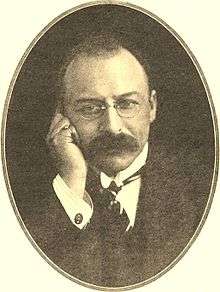George Marlow
George Marlow (24 September 1876 – 21 May 1939)[1] (born Joseph Marks)[2] was an Australian theatrical entrepreneur born in London of Jewish extraction,[3] noted for bringing melodrama and pantomime to Sydney audiences in the early 1900s.

He came to Australia as a child, and started acting and playing piano for stage plays.[4] He was playing with the William Anderson organisation[4] in Sydney[5] and Brisbane[6] in 1899 as was his future wife Ethel Buckley (born ca. 1885). Ethel had made a mark as Puck in a George Rignold production of Midsummer Night's Dream at the age of twelve, a role she reprised several times, then melodramas such as The Luck of Roaring Camp in 1907. She worked six months in London [7][8] After her marriage (ca. 1910) to Marlow, she starred in his shows. Her most famous role was as "Cigarette" in an adaptation of the Ouida novel Under Two Flags in 1915.[4]
He became involved in the managerial side of the theatre, first with William Anderson,[4] then from around 1904 with the Fuller family chain.[9] By 1907 he had his own company, first leasing a theatre in Newcastle.[4] By Christmas 1910 he was lessee of, then a year later purchased the Princess's Theatre, Melbourne. In 1911 he built The Adelphi, in Castlereagh Street, Haymarket, Sydney,[4] the largest theatre in Australia.[10] The Bad Girl of the Family was his first production in the new theatre, followed by the George Fowler musical The Fatal Wedding[11] and the melodrama The Rosary.[12] He took The Bad Girl of the Family to London around the same time. They were still in UK in 1912[13]
After purchasing the Princess's Theatre, he hired as manager of The Adelphi George Willoughby (full name George Willoughby Dowse),[2] who made a great success of it. Willoughby, with Arthur Bernard Davies and George T Eaton bought him out in 1913, reportedly for £50,000,[4] but had problems with Marlow's continuing involvement.[14] In 1915 Marlow in partnership with Ben Fuller bought out Willoughby.[4] and 1916 renamed it the Grand Opera House.[15] Some years later it became the Tivoli.
Marlow also directed some feature films, Driving a Girl to Destruction (1911) and Angel of his Dreams (1912).[16]
His Leading Actors
Around 1910, the 15year old Louise Lovely (then as Louise Carbasse) was one of his "stars".[17] Other noted actors in his troupes included Arthur Shirley,[18] Nellie Bramley and Vera Spaull.[19]
Although he claimed not to be interested in producing "classics",[20] he managed the Grand Shakespearean Company from 1916–1920 at the Princess, with such hits as The Merchant of Venice starring Allan Wilkie.
In 1916, Carrie Moore made an appearance as "principal boy" in his pantomime Dick Whittington at the Adelphi. Presumably her famous legs were a major attraction of the show.[21]
Later years
In partnership with Nacio Herb Brown, he produced The Sneak in 1922[22]
By 1925 The Grand Opera House had become rather unfashionable.[4] In 1929 he partnered with the infamous Ernest C. Rolls to produce revue Clowns in Clover and Whoopee at The Empire. Both failed and Marlow-Rolls Theatres collapsed owing £50,000.
He produced a Christmas pantomime Beauty and the Beast around 1930 at the Grand Opera House with songs by the great cricketer Don Bradman and Jack Lumsdaine.,[23] Billy Moll, Harry Richman and Murray Mencher[24]
George and Ethel were still together in 1937, even appearing in a pantomime.[25]
He was a longtime racing enthusiast, owning horses including Trinobantes, Somnolent, Halifax and Georgio, and was for a time on the Tattersall's Club committee.[3] He died in a Sydney nursing home, survived by his wife and a daughter Marie.[1] His estate was valued at £30,110.
References
- The Argus 22 May 1939
- The Argus 31 May 1913
- Sydney Morning Herald 23 May 1939
- West, John Theatre in Australia Cassell Australia ISBN 0-7269-9266-6
- Sydney Morning Herald 17 February 1899
- Brisbane Courier 10 March 1899
- Sydney Morning Herald 11 February 1908
- The Advertiser 1 October 1908
- Sydney Morning Herald 12 April 1904
- Sydney Morning Herald 18 February 1911
- "Come down and hear the organ [music] / written & composed by Geo. Fowler". Catalogue.nla.gov.au. Retrieved 27 June 2013.
- Sydney Morning Herald 21 September 1911
- Sydney Morning Herald 9 March 1912
- Sydney Morning Herald 11 August 1913
- "Sir Benjamin Fuller". Liveperformance.com.au. Archived from the original on 20 April 2013. Retrieved 27 June 2013.
- "Marlow Again in Entertainment Field". Everyones. 24 March 1928. p. 3.
- ADB page on Louise Lovely
- ADB page on Arthur Shirley
- The Argus 13 June 1925
- Brisbane Courier 3 December 1910
- "Carrie Moore Part 2". Hat-archive.com. Retrieved 27 June 2013.
- "The sneak! [music] / by Nacio Herb Brown". Catalogue.nla.gov.au. 30 September 2009. Retrieved 27 June 2013.
- "Australian music in Trove – Trove". Musicaustralia.org. Retrieved 27 June 2013.
- "Ro-ro-rollin' along [music] / words by Billy Moll & Harry Richman ; music by Murray Mencher". Catalogue.nla.gov.au. Retrieved 27 June 2013.
- Sydney Morning Herald 9 July 1937